一般疑问句和特殊疑问句精编版
- 格式:docx
- 大小:423.79 KB
- 文档页数:15

一般疑问句和特殊疑问句集团标准化办公室:[VV986T-J682P28-JP266L8-68PNN]一般疑问句与特殊疑问句Date:_______ name:_______一、【一般疑问句】1. 定义:用be、助动词或情态动词置于句首,并以“Yes,…”,或“No,…”或相当于yes / no回答的问句称为一般疑问句.2. 含系动词be的一般疑问句的构成:Be +主语+其它注意:am 只能跟在第一人称的单数 I 后面;are 搭配 you,不管you是单数还是复数;is 跟在第三人称单数 he, she, it后面Eg: I'm in Class 2, Grade 7.→ Are you in Class 2, Grade 7 (如遇第一人称,最好将其置换成第二人称)It's a map of China.→Is it a map of China这是一幅中国地图吗3. 含实义动词的一般疑问句的构成:Do/Does +主语 + 动词原形 + 其它注意:主语为第三人称单数,谓语动词为一般现在时单数第三人称形式"v-(e)s"时,用does,并要将谓语动词变回原形(如has→have,likes→like等);有时陈述句中的some还要变作any等。
如:Eg: She lives in Beijing. →Does she live in BeijingI like English. →Do you like EnglishThere are some books on my desk.→Are there any books on your desk4. 含情态动词的一般疑问句的构成:情态动词+主语+动词原形+其它Eg: I can spell it. →Can you spell it?I will do that for her. →Will you do that for her?She can drive. →Can she drive5. 一般疑问句的应答动词保持一致。
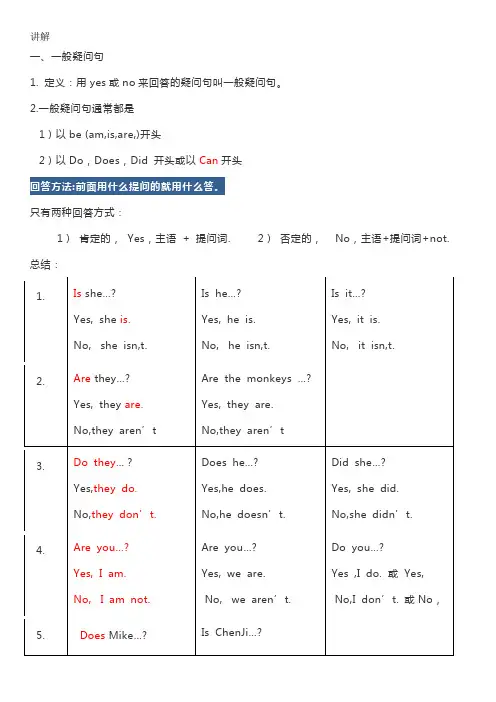

一般疑问句与特殊疑问句01一般疑问句一般疑问句通常需要用yes 或no 来回答,所以又叫做“是非疑问句”。
在读这种句子时要用升调。
一般疑问句主要有以下几种类型:一、“be + 主语+ 表语”结构— Are you sleepy ? 你困了吗?— Yes, I am . 是的,我困了。
二、“情态动词+ 主语言+ 行为动词(或be)”结构— May/Can I use the telephone? 我能用这部电话吗?— Yes, you can. 是的,可以。
三、“助动词(do, does, did)+ 主语+ 行为动词”结构— Do you like swimming in summer? 你喜欢夏天游泳吗?— No, I don`t . 不,我不喜欢。
四、难点提示:回答否定性一般疑问句时,要在Yes 后面用肯定结构,表示肯定;在No 后面用否定结构,表示否定。
注意在说法上正好与汉语习惯相反。
诀窍是在回答的时候,只要把它当成没有加否定形式的普通一般疑问句看待就可以了。
注意下面例句的回答和它的意思。
— Is he not your elder brother? 他不是你的哥哥吗?—Yes, he is . 不,他是(我的哥哥)。
—No, he is not. 是的,他不是(我的哥哥)。
— Isn`t she very clever? 她难道不是很聪明吗?— Yes, she is. 不,她很聪明。
— No, she is not . 是,她不聪明。
02特殊疑问句一、特殊疑问句是用来提出来特定问题的疑问句,要求听到问题的人针对特定情况来做具体的回答,不能像一般疑问句一样简单地用Yes 或No 来回答,特殊疑问句要用降调来读。
二、特殊疑问句的结构:特殊疑问词+ 一般疑问句Who do English homework in the evening?谁晚上做英语家庭作业?What do you do in the evening?你晚上做什么?What homework do you do in the evening?你晚上做什么家庭作业?When do you do English homework?你什么时候做英语家庭作业?三、注意:对人提问时wh o“谁”对所属(谁的)提问用whose“谁的”对哪一个提问用which“哪一个”对时间提问用when“什么时候”或what time“几点”对物体提问用what“什么”对地点提问用where“哪里”对原因提问用why“为什么”对方式提问用how“怎么样”对数量提问用how many“多少”(用于可数名词复数)或how much“多少”(用于不可数名词)四、难点提示1、以why开头的特殊疑问句否定形式常用于表示建议、请求等。
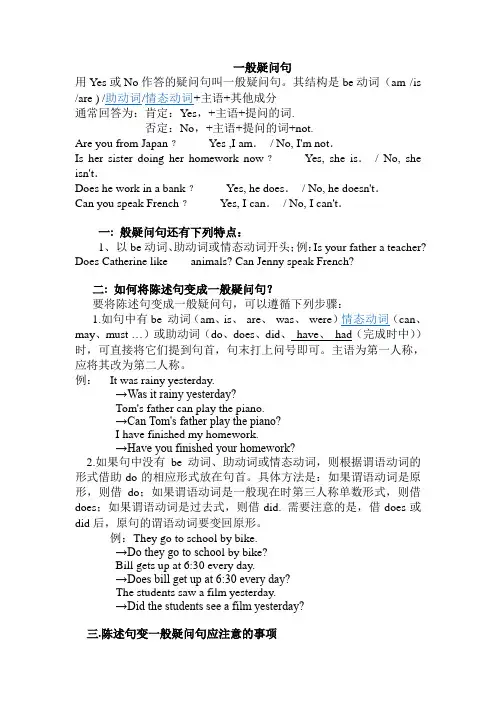
一般疑问句用be动词(am /is主语+其他成分,+主语+提问的词.否定:No,+主语+提问的词+not.Are you from Japan﹖Yes ,I am./ No, I'm not.Is her sister doing her homework now﹖Yes, she is./ No, she isn't.Does he work in a bank﹖Yes, he does./ No, he doesn't.Can you speak French﹖Yes, I can./ No, I can't.一: 般疑问句还有下列特点:1、以be动词、助动词或情态动词开头;例:Is your father a teacher? Does Catherine like animals? Can Jenny speak French?二: 如何将陈述句变成一般疑问句?1.如句中有be 动词(am、is、are、was、were can、may、must …)或助动词(do、does、did、have、had(完成时中))时,可直接将它们提到句首,句末打上问号即可。
主语为第一人称,应将其改为第二人称。
例:It was rainy yesterday.→Was it rainy yesterday?Tom's father can play the piano.→Can Tom's father play the piano?I have finished my homework.→Have you finished your homework?2.如果句中没有be动词、助动词或情态动词,则根据谓语动词的形式借助do的相应形式放在句首。
具体方法是:如果谓语动词是原形,则借do;如果谓语动词是一般现在时第三人称单数形式,则借does;如果谓语动词是过去式,则借did. 需要注意的是,借does或did后,原句的谓语动词要变回原形。

一般疑问句和特殊疑问句知识点总结疑问句最常见的疑问句有两类:1.一般疑问句:可以用Yes和No回答的问句2.特殊疑问句:以特殊疑问词7w1h(比如what/how等等)开头的疑问句一般疑问句(句型结构会根据时态发生相应的细微变化,但总体框架不变)①be动词+主语+其他?(注意be动词和主语的匹配)例句:Areyoua policeman?你是个警察吗?-Yes, I am.是的,我是。
-No, I am not.不,我不是。
②情态动词+主语+动词原形+其他?(注意情态动词后面跟动词原形)例句:Canyouswim?你会游泳吗?-Yes, I can.是的,我会。
-No, I can’t.不,我不会。
③助动词+主语+动词原形+其他?(注意助动词和主语的匹配)例句:Doyoulikedancing?你喜欢跳舞吗?-Yes, I do.是的,我喜爱。
-No, I don’t.不,我不喜欢。
Doyougoto school every day?你每天去学校吗?做句型转换的方法(如何将陈述句变成一般疑问句):先看句子中是否有be动词或者情态动词A.如果有be动词或者情态动词,对照一般疑问句句型①/②将be动词或者情态动词提到句首,其他局部依次照抄B.如果没有be动词或者情态动词,对照一般疑问句句型③句首+助动词(注意是不是要和主语婚配变化),其他局部依次照抄,注意原来的动词要变为真相#无论是哪种情况,都要注意第一人称要酿成第二人称,第二人称要酿成第一人称(you和I的切换)非凡疑问句(句型结构会根据时态发生相应的细微变化,但总体框架不变)①特殊疑问词(作主语)+谓语+其他?(陈述句语序)例句:Whois reading a book?谁正在读书?Whichis the biggest?哪个是最大的?Wholikes dancing?谁喜爱跳舞?②非凡疑问词(作主语修饰语)+主语+谓语+其他?(陈说句语序)例句:Whosebagis red?谁的包是红色的?How manypeoplework in the school?有多少人在学校工作?③特殊疑问词+一般疑问句(详见上面的一般疑问句结构)?(此情况为当特殊疑问词代替的部分不是主语或者主语修饰语时)例句:What areyoudoing?你在做什么?What colour doyoulike?你喜欢什么颜色?做句型转换的方法(如何将句子转变成特殊疑问句):先看划线局部是不是为句子中的主语或者主语修饰语A.如果是主语,对照非凡疑问句句型①划线部分用特殊疑问词代替,其他部分照抄(该疑问句为陈述句语序)B.如果是主语修饰语,对照特殊疑问句句型②划线部分用特殊疑问词代替,其他部分照抄(该疑问句为陈述句语序)C.如果不是主语或者主语修饰语,对照特殊疑问句句型③先将原来的陈述句变成一般疑问句(如果本来就是一般疑问句就不需要再做修改)划线局部用非凡疑问词替代再将特殊疑问词提前到句首#如果划线局部是动词或者动词短语,表示做什么事,那变为非凡疑问词的时候要用do what替代非凡疑问词主要分为两类:wh-(wh开头的疑问词)和how - (how开头的疑问词)疑问词whatwhowhosewhichwherewhenwhywhat for what colour what day what date what time 含义什么谁谁的哪一个在哪里什么时候为什么为什么什么颜色星期几什么日期几点钟用法问东西问人问归属问挑选问地址问时间问原因。
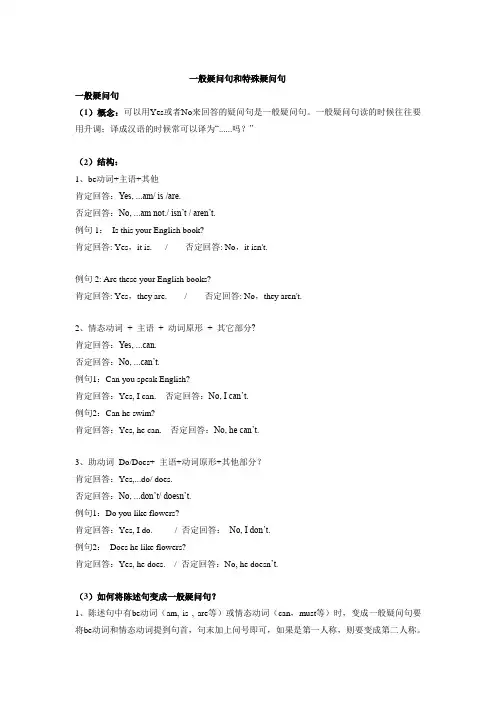
一般疑问句和特殊疑问句一般疑问句(1)概念:可以用Yes或者No来回答的疑问句是一般疑问句。
一般疑问句读的时候往往要用升调;译成汉语的时候常可以译为“......吗?”(2)结构:1、be动词+主语+其他肯定回答:Yes, ...am/ is /are.否定回答:No, ...am not./ isn’t / aren’t.例句1:Is this your English book?肯定回答: Yes,it is. / 否定回答: No,it isn't.例句2: Are these your English books?肯定回答: Yes,they are. / 否定回答: No,they aren't.2、情态动词+ 主语+ 动词原形+ 其它部分?肯定回答:Yes, ...can.否定回答:No, ...can’t.例句1:Can you speak English?肯定回答:Yes, I can. 否定回答:No, I can’t.例句2:Can he swim?肯定回答:Yes, he can. 否定回答:No, he can’t.3、助动词Do/Does+ 主语+动词原形+其他部分?肯定回答:Yes,...do/ does.否定回答:No, ...don’t/ doesn’t.例句1:Do you like flowers?肯定回答:Yes, I do. / 否定回答:No, I don’t.例句2:Does he like flowers?肯定回答:Yes, he does. / 否定回答:No, he doesn’t.(3)如何将陈述句变成一般疑问句?1、陈述句中有be动词(am, is , are等)或情态动词(can,must等)时,变成一般疑问句要将be动词和情态动词提到句首,句末加上问号即可,如果是第一人称,则要变成第二人称。
例如:She is a clever girl. → Is she a clever girl?I can swim. → Can you swim?2、句子里面含有实义动词(如like, likes, have,has, run, swim, jump等)。
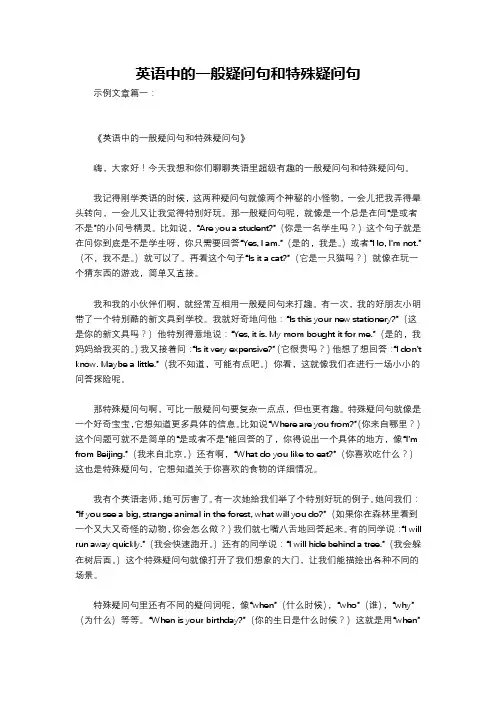
英语中的一般疑问句和特殊疑问句示例文章篇一:《英语中的一般疑问句和特殊疑问句》嗨,大家好!今天我想和你们聊聊英语里超级有趣的一般疑问句和特殊疑问句。
我记得刚学英语的时候,这两种疑问句就像两个神秘的小怪物,一会儿把我弄得晕头转向,一会儿又让我觉得特别好玩。
那一般疑问句呢,就像是一个总是在问“是或者不是”的小问号精灵。
比如说,“Are you a student?”(你是一名学生吗?)这个句子就是在问你到底是不是学生呀,你只需要回答“Yes, I am.”(是的,我是。
)或者“No, I'm not.”(不,我不是。
)就可以了。
再看这个句子“Is it a cat?”(它是一只猫吗?)就像在玩一个猜东西的游戏,简单又直接。
我和我的小伙伴们啊,就经常互相用一般疑问句来打趣。
有一次,我的好朋友小明带了一个特别酷的新文具到学校。
我就好奇地问他:“Is this your new stationery?”(这是你的新文具吗?)他特别得意地说:“Yes, it is. My mom bought it for me.”(是的,我妈妈给我买的。
)我又接着问:“Is it very expensive?”(它很贵吗?)他想了想回答:“I don't know. Maybe a little.”(我不知道,可能有点吧。
)你看,这就像我们在进行一场小小的问答探险呢。
那特殊疑问句啊,可比一般疑问句要复杂一点点,但也更有趣。
特殊疑问句就像是一个好奇宝宝,它想知道更多具体的信息。
比如说“Where are you from?”(你来自哪里?)这个问题可就不是简单的“是或者不是”能回答的了,你得说出一个具体的地方,像“I'm from Beijing.”(我来自北京。
)还有啊,“What do you like to eat?”(你喜欢吃什么?)这也是特殊疑问句,它想知道关于你喜欢的食物的详细情况。
我有个英语老师,她可厉害了。
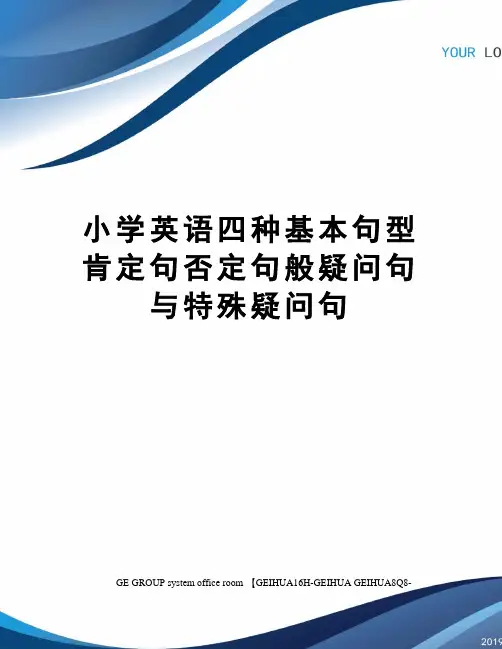
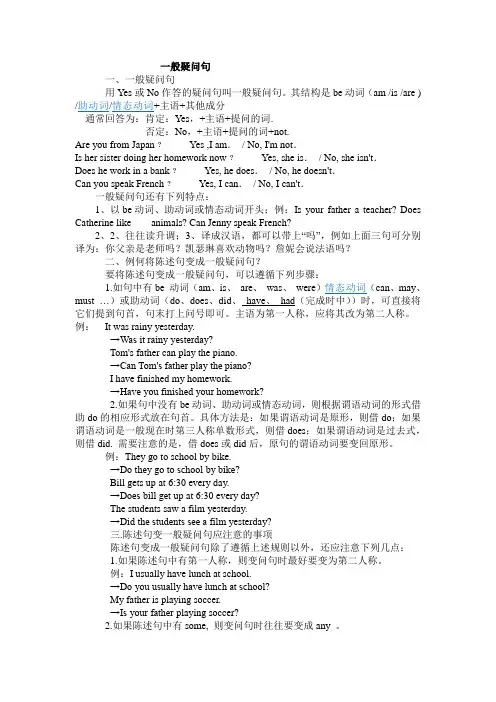
一般疑问句一、一般疑问句作答的疑问句叫一般疑问句。
其结构是be动词(am /is /are )主语+其他成分Yes,+主语+提问的词.否定:No,+主语+提问的词+not.Are you from Japan﹖Yes ,I am./ No, I'm not.Is her sister doing her homework now﹖Yes, she is./ No, she isn't.Does he work in a bank﹖Yes, he does./ No, he doesn't.Can you speak French﹖Yes, I can./ No, I can't.一般疑问句还有下列特点:1、以be动词、助动词或情态动词开头;例:Is your father a teacher? Does Catherine like animals? Can Jenny speak French?2、2、往往读升调;3、译成汉语,都可以带上“吗”,例如上面三句可分别译为:你父亲是老师吗?凯瑟琳喜欢动物吗?詹妮会说法语吗?二、例何将陈述句变成一般疑问句?1.如句中有be 动词(am、is、are、was、were can、may、must …)或助动词(do、does、did、have、had(完成时中)它们提到句首,句末打上问号即可。
主语为第一人称,应将其改为第二人称。
例:It was rainy yesterday.→Was it rainy yesterday?Tom's father can play the piano.→Can Tom's father play the piano?I have finished my homework.→Have you finished your homework?2.如果句中没有be动词、助动词或情态动词,则根据谓语动词的形式借助do的相应形式放在句首。
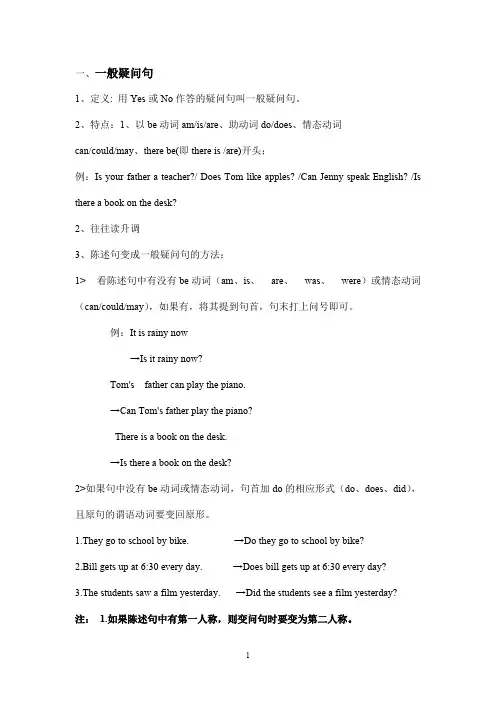
一、一般疑问句1、定义: 用Yes或No作答的疑问句叫一般疑问句。
2、特点:1、以be动词am/is/are、助动词do/does、情态动词can/could/may、there be(即there is /are)开头;例:Is your father a teacher?/ Does Tom like apples? /Can Jenny speak English? /Is there a book on the desk?2、往往读升调3、陈述句变成一般疑问句的方法:1> 看陈述句中有没有be动词(am、is、are、was、were)或情态动词(can/could/may),如果有,将其提到句首,句末打上问号即可。
例:It is rainy now→Is it rainy now?Tom's father can play the piano.→Can Tom's father play the piano?There is a book on the desk.→Is there a book on the desk?2>如果句中没有be动词或情态动词,句首加do的相应形式(do、does、did),且原句的谓语动词要变回原形。
1.They go to school by bike. →Do they go to school by bike?2.Bill gets up at 6:30 every day. →Does bill gets up at 6:30 every day?3.The students saw a film yesterday. →Did the students see a film yesterday?注: 1.如果陈述句中有第一人称,则变问句时要变为第二人称。
I usually have lunch at school. →Do you usually have lunch at school?2.如果陈述句中有some, 则变问句时往往要变成any 。
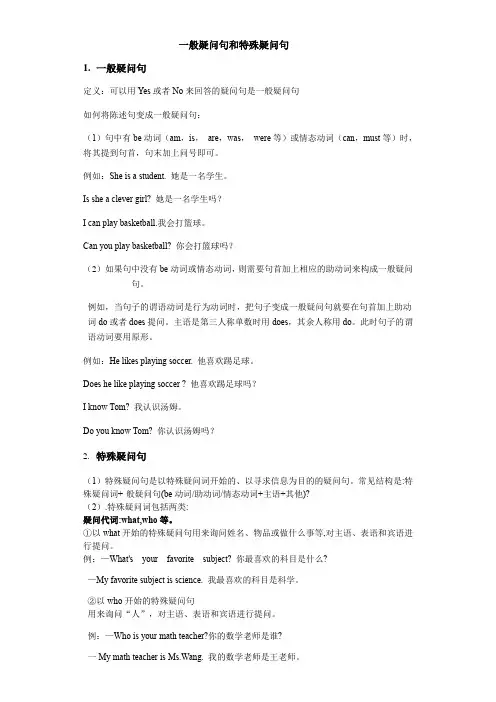
·一般疑问句一般疑问句通常是以be,have,助动词或情态动词开头,回答时用Yes或No.朗读时用升调,如:1.Is he lying on the sofa?他正躺在沙发上吗?Yes,he is.是的。
2.Can I open the window?我能打开窗吗?No,you can’t.不,你不能3.Have you ever been to Beijing?你曾经去过北京吗?Yes,I have.是的,我去过4.Does he like sandwich?他喜欢三明治吗?No,he doesn’t.不,他不喜欢5.Do you often watch TV? 你经常看电视吗?Yes, I do. 是的,我经常看。
一般题问句的回答:一般疑问句的肯定回答用Yes,后接肯定结构;否定回答用No,后接否定结构。
即回答完Yes或No之后把疑问句句首前两个词颠倒过来照抄,否定回答需要在照抄之后加入not表达否定意思。
(注意当问到you或I时例外,回答要把you改成I或把I改成you,句尾+not,可缩写为n't,如例句2,3)注意:一般疑问句的句式是:1.Am/ Is /Are/ Was/ Were+主语其它?2.Do/ Does/ Did/ Will/ Shall/ Can/ May/ Must..+主语+动词原形+其它?3.Have/ Has/ Had+主语+动词过去分词+其它(初二的知识,暂时不用掌握)PS:加粗部分时需要着重注意的,回答问句的特点就是怎么问的就怎么回答。
红色部分是高频出现的,也是考试常考的。
蓝色部分了解即可,不需要掌握。
·特殊疑问句特殊疑问句是对句子中某一部分提问的疑问句,常以疑可词who,whom,whose,what,which,when,why,where,how等引导。
朗读时,一般用降调。
如:1.What programmes do you often watch? 你经常看什么电视节目?I often watch cartoons. 我经常看动画片。
小学英语肯定句、否定句、一般疑问句和特殊疑问句的详解一、肯定句、否定句、一般疑问句和特殊疑问句定义即不含有否定词“不”。
1.肯定句:表示肯定的意思,I am a student. 比如:我是一个学生 He goes to school. 他去上学.否定句:表示否定的意思。
2 I am not a boy比如:我不是一个男孩。
He does not go to school.他不去上学”的问句。
:回答为“是yes”或者“否no3. 一般疑问句 Are you a student? 比如:你是一个学生吗? Do you like English? 你喜欢英语吗?。
no”的问句,根据提问内容具体回答4. 特殊疑问句:回答不是“是yes”或者“否 the time?s What'比如:现在几点了? is your pen? 哪一支笔是你的? Which 二、肯定句、否定句、一般疑问句和特殊疑问句的相互转换的句子有am, is, are 其余按顺序照抄。
后面加上not,肯定句变否定句:在am, is, are 其余照抄。
提前放到句首并大写Am, Is, Are,肯定句变一般疑问句:把am, is, are 3步骤肯定句变特殊疑问句(就划线部分提问):分第一步:先变一般疑问句第二步:找合适的特殊疑问词代替划线部分(划线部分不能在特殊疑问句中出现)第三步:特殊疑问词提前放到句首,并大写,其余按顺序照抄,省略划线部分。
例如:肯定句、否定句和一般疑问句的互换1.This is a book. 肯定句:This is not a book.否定句:Is this a book? 一般疑问句:Yes, it is. 肯定回答:t.'否定回答:No, it isn) (变特殊疑问句2.就划线部分提问This is a book.Is this a book?第一步:变一般疑问句 Is this what ?第二步:找合适的特殊疑问词this? What is 并大写,第三步:特殊疑问词提前放到句首,其余按顺序照抄,省略划线部分。
(完整版)⼀般疑问句、特殊疑问句陈述句含义:⽤于陈述事实和观点的句⼦。
陈述句包括肯定结构和否定结构。
This is a desk.(肯定结构)He can sing and dance.(肯定结构)He doesn’t have a computer.(否定结构)There aren’t any pictures.(否定结构)肯定句变否定句:1.be动词的否定式be:am ,is ,are,was were构成否定式时,⼀律在后⾯加否定词notHe is reading. →He is not reading.They are from China. →They are not from China.2. 情态动词的否定式情态动词:can, could, must , may, might, will, would,shall,should , need,……构成否定式时,⼀律在情态动词后⾯加否定词notI can swim. →I can not swim.You should arrive here on time.→You should not arrive here on time.构成否定式时,要借助助动词do, does, did,在⼀般现在时中⽤do或者does,在⼀般过去时中⽤did。
结构为:主语+don’t\doesn’t\didn’t+动词原形+其它I like pop music. →I don’t like pop music.She often swims. →She doesn’t often swim.He handed in his homework.→He didn’t hand in his homework.⼀般疑问句含义:⼀般疑问句是疑问句的⼀种。
它是只⽤yes(是)或no(否)来回答的句⼦。
其结构是:系动词be/助动词/情态动词+主语+其他成分1)谓语动词是be动词规律:He is a student. Is he a student?1She is swimming. Is she swimming?2)谓语中含有助动词have/has/had (通常是在现在完成时和过去完成时中:have / has / had + 过去分词)规律:Tom has finished his homework. →Has Tom finished his homework?I have eaten breakfast. →Have you eaten breakfast?3)谓语动词中含有情态动词时。
一般疑问句及特殊疑问句总结(针对小学阶段学生)第一篇:一般疑问句及特殊疑问句总结(针对小学阶段学生) 一般疑问句及特殊疑问句的总结一般疑问句的定义:用yes或no来回答的疑问句叫一般疑问句。
一般疑问句的三种常见形式:1.be动词+主语+其他?(be动词有am is are)Are you a student?Are they happy?Are the books on the shelf?Is she a beautiful girl?Is he a good boy?Are there any books in the bag? Is there any juice in the cup?2.情态动词+主语+其他?(情态动词有can may must)Can he balance on the ball?Can they play basketball?Must he eat breakfast at six o'clock?May I borrow your book?3.助动词+主语+其他?(助动词有do does did)Do you play soccer on weekend?Do they live in Beijing?Does he/she go to the park on Thursday?附加:最近他们学的have got 固定词组“有”相关的一般疑问句是Have they got any orange juice in the fridge?肯定回答是yes, they have.否定回答是no, they haven't.所有一般疑问句的肯定回答都是:yes,主语+句子开头的词(助动词,情态动词,be动词)特殊疑问句的定义:有5个W和一个H(who whose which what where+how)这六个疑问词引导的的疑问句叫特殊疑问句。
特殊疑问句的句型结构是:特殊疑问词+(be动词,情态动词,助动词)+主语+其他?第二篇:中学英语特殊疑问句1.2.3.4.5.6.7.8.9.10.11.12.13.14.15.16.17.18.19.20.21.22.23.24.25.26.27.28.29.30.31.32.33.34.35.36.What subject do you like? Ilike English/Chinese/Math/history etc.What school are you in? I am in NO.6 middle school.What’s your favorite subject? My favorite subject is English.What animal do you like? I like dogs/cats/sheep etc.What sport can you do? I can play basketball/football/badminton/volleyball etc.How mangy people are there in your family? There are four people in my family.How do you go to school? I go to school on foot/by car/by bus etc.How many English lessons do you have a week? I have 6 English lessons a week.What do you usually do after school? I usually do my homework, watch TV, play computer games after school.When do you go to bed every day? I go to bed at 9 o’clock.What do you do before sleep? I read books before slee p.When’s your birthday? My birthday is on June the 19th.How many months are there in a year? There are 12 months in a year.What’s your favorite holiday? My favorite holiday is summer holiday.How many seasons are there in a year? There are 4 seasons in a year.What season do you like best? I like summer best.What do American children do on Christmas? They will go shopping and buy lots of gifts and decorate their houses.What do you usually do at the weekends? I usually do my homework and play games with my fri ends.What do you do on Children’s day? I play games with my friends and have a big dinner with my parents.What present do you want to get on Children’s Day? I want to get an English dictionary on Children’s Day.What’s your father’s job? My father is an off icer.Where is your home? My home is in Macao.Which floor do you live? I live on the second floor.What do you usually buy when you go to supermarket? I usually buy some delicious food and fruit.Withwhom you often play table tennis? I often play table tennis with my father.What do you like doing at the PE lessons? I like playing football and basketball.What do you usually do after lunch? I usually have a sleep after lunch.What food do you like? I like KFC.What time do you usually go to school? I usually go to school at 7:00.How does your father go to work? He goes to work by car.What will you do when you grow up? I want to be an English teacher when I grow up.What will you do if you have 5,000,000 yuan? I want to travel around the world and buy a villa in the countryside.Which do you prefer, country life or city life? I like country life because it is more comfortable.What’s the motto of Olympic? Faster, higher, stronger.What’s Hangzhou famous for? West Lake.Which country do you want to go first if you have a lot of money? I want to go to Canada.第三篇:反义疑问句特殊用法总结1.当陈述部分的主语是I,而句子又用来征询对方的意见时,附加疑问句中的主语用you。
一般疑问句和特殊疑问句例句在日常交流中,疑问句可是不可或缺的!说到疑问句,大家一定都知道分为一般疑问句和特殊疑问句。
简单来说,一般疑问句就像那种你随便问个“你好吗?”的感觉。
嘿,听上去是不是很轻松?一般疑问句通常只需要一个“是”或“不是”就能搞定,真是省事。
比如说:“你喜欢吃水果吗?”哎呀,谁能拒绝美味的水果呢!再比如:“你要去派对吗?”这句话问得就很随意,很日常,让人心里暖暖的。
然后呢,特殊疑问句就稍微复杂一点了。
它就像是在问一些更深入的问题,让人不得不认真思考。
例如:“你最喜欢的水果是什么?”这时候可就得动动脑筋,可能是香蕉,也可能是苹果,甚至是奇异果!特殊疑问句通常带有疑问词,比如“什么”、“谁”、“哪里”、“为什么”,让对话显得更加丰富多彩。
就像在聊天时,突然有人问你:“你为什么喜欢那部电影?”这可得好好想想,可能是因为剧情感人,或者演员帅气。
我跟你说,使用这些疑问句的时候,可得注意语气哦!一般疑问句可以用一种轻松的语气来问,让人觉得随意又自在。
而特殊疑问句则可以稍微正式一些,或者加上一点好奇的语气,比如:“你到底在想什么?”这样就能引起对方更多的兴趣,可能会让他们更愿意分享自己的想法。
哈哈,想想看,如果在聚会上,你突然问某个朋友:“你最近在忙什么?”那可就能引发一场小小的讨论,大家聊得热火朝天,真是开心。
疑问句还可以用来调侃,比如说:“你今天怎么又迟到了?又去吃美食了吗?”这就带着点调侃的意味,气氛立刻轻松起来。
而特殊疑问句也可以用来表达关心,像是:“你今天看起来有点累,是不是工作压力大?”这种关心让对方感受到温暖。
咱们生活中,疑问句无处不在,像是那亲切的邻居,随时出现在你面前。
我们甚至会用疑问句来引入话题,比如:“你听说最近的那个新电影了吗?”瞬间话题就来了,大家都能参与进来,讨论热火朝天。
这样的交流真是妙不可言。
再说到特殊疑问句,很多时候可以带出一段精彩的故事。
想象一下,一个朋友一脸兴奋地说:“你知道我上周去了哪里吗?”这句开场白可真引人入胜,立刻吸引住了你的注意力,心里开始期待着他的故事。
一般疑问句和特殊疑问句GE GROUP system office room 【GEIHUA16H-GEIHUA GEIHUA8Q8-一般疑问句与特殊疑问句Date:_______ name:_______一、【一般疑问句】1. 定义:用be、助动词或情态动词置于句首,并以“Yes,…”,或“No,…”或相当于yes / no回答的问句称为一般疑问句.2. 含系动词be的一般疑问句的构成:Be +主语+其它注意:am 只能跟在第一人称的单数 I 后面;are 搭配 you,不管you是单数还是复数;is 跟在第三人称单数 he, she, it后面Eg: I'm in Class 2, Grade 7.→ Are you in Class 2, Grade 7 (如遇第一人称,最好将其置换成第二人称)It's a map of China.→Is it a map of China这是一幅中国地图吗3. 含实义动词的一般疑问句的构成:Do/Does +主语 + 动词原形 + 其它注意:主语为第三人称单数,谓语动词为一般现在时单数第三人称形式"v-(e)s"时,用does,并要将谓语动词变回原形(如has→have,likes→like等);有时陈述句中的some还要变作any等。
如:Eg: She lives in Beijing. →Does she live in BeijingI like English. →Do you like EnglishThere are some books on my desk.→Are there any books on your desk4.Eg: I can spell it. →Can you spell it?I will do that for her. →Will you do that for her?She can drive. →Can she drive5. 一般疑问句的应答动词保持一致。
如:① -Is Mary a Japanese girl? -Yes, she is. / No, she isn't.② -Can Lily speak Chinese- Yes, she can./ No, she can't. / Sorry, I don't know.下面浅谈一下陈述句变一般疑问句的变化规则。
1.句中有"is、 are或can"的句子,把"is、are或can"提到句首,句号变问号。
例如:原句一般疑问句He is Tom.Is he TomThis is a bird. Is this a bird?Lulu can dance.Can Lulu danceThey are playing basketball.Are they playing basketball?2.以"I am…… "和"We are……" 开头的句子,把"I am……"和"We are…… 均变成"Are you……" 句号变问号,其他单词不变。
例如:原句一般疑问句I am a teacher.We are playing basketball.Are you a teacher?Are you playing basketball?3.句中没有"am、is、are和 can"的句子,如果主语是第一人称、第二人称或第三人称复数的句子,句首加"Do",“I 、We”变成“you”,句号变问号,其余单词不变。
例如:原句一般疑问句I like music Do you like music?We have some rulers.Do you have some rulers?They like watching TV.Do they like watching TV?4.句中没有"am、 is、 are" 的句子,如果主语是第三人称单数时,句首加"Does",动词变原型,句号变问号,其他单词不变。
如:原句一般疑问句He likes football.Does he like football?Jim has a ruler Does Jim have a ruler?注:变疑问句后的第一个单词的第一个字母必须大写!二、【特殊疑问句】1. 定义: / 进行发问,回答时针对问句中的代词和副词来回答,不用yes或no的句子叫特殊疑问句。
2. 特殊疑问词全搜索:一句话: wh-开头外加能与之结伴同行的名词; how及它的形容词兄弟姐妹们,即如: what,where,which,what class,what time,what number,who, whom, whose;how,how many,how old,how much等。
无论是做疑问代词还是限定词,which 和 what 所指的范围不同。
what所指的范围是无限的,而which则指在一定的范围内,例如:Which girls do you like best 你喜欢哪几个姑娘What girls do you like best 你喜欢什么样的姑娘Which do you prefer, coffee or tea 咖啡和茶,你喜欢喝哪种What do you usually drink before dinner 你饭前通常喝什么Whom是who的宾格,在书面语中,它作动词宾语或介词宾语,在口语中作宾语时,可用who代替,但在介词后只能用whom,例如:Who(m) did you meet on the street? 你在街上遇到了谁(作动词宾语)Who(m) are you taking the book to? 你要把这书带给谁(作介词宾语,置句首)3.How old are you你多大了What's this in English这个用英语怎么讲4. 询问天气的方式。
“How +be +the weather...”与“What + be + the weather like...”意思相同。
Eg: How is the weather today = What's the weather like today 今天天气如何【巩固练习】1)①The twins were making a kite when their mother came in. (对划线部分提问)______ _____ the twins _____ when their mother came in②Mrs Turner asked her son to buy some eggs for supper. (对划线部分提问)_______ ______ Mrs Turner ask her son ______ _______ for supper2)对限定名词的定语提出疑问,疑问词应用which,而且必须和名词连用。
I'm going to take the shirt on the right.(对划线部分提问)______ _____ are you going to take3)对指人名词或代词提问用who,作宾语时提问用whom。
4)对物主代词和名词所有格提问用whose。
eg. Li Ping's coat→Whose coat,my father→Whose father5)对具体时间提出疑问,如 in the morning,last Sunday等,疑问词用when;对具体几点钟提问,疑问词应用what time。
6)对具体地点提出疑问,疑问词应用where。
The pupils are having a picnic at the foot of the hill. (对划线部分提问)_____ _____ the pupils having a picnic7)对表原因的从句提问,常见的有because引导的从句,疑问词应用why。
Xiao Cheng didn't go to the farm with us because he was ill. (对划线部分提问)_______ _____ Xiao Cheng go to the farm with us8)对程度或方式等提出疑问,用疑问词How。
eg. I usually go to school by bike.How is that movie I like it very much.9)对数量提出疑问,疑问词为How many,要注意how many必须跟名词的复数形式。
eg. two hundred sheep→How many sheep10)对价格提出疑问,疑问词用How much。
eg. I paid fifty yuan for the sweater.______ ______ did you pay for the sweater11)对时间长度(时间段)提出疑问,疑问词应用How long。
eg. I've worked in that factory for two years. (划线提问)______ _____ _______ you worked in that factory12)对时间频率,如 once a year, twice a week等提问,疑问词用How often。
How often do you visit your grandma?13)对具体次数,如 once, twice, three times等提问,疑问词用How many times。
eg. ----- did he call you the day before yesterday? -----Twice.A. What timeB. How many timesC. How muchD. How long14)对in+一段时间提问,疑问词一般用How soon。
eg. Jane and her brother will finish the work in two hours. (划线提问)_____ _____ _____ Jane and her brother finish the work15)对距离提出疑问,疑问词用How far。